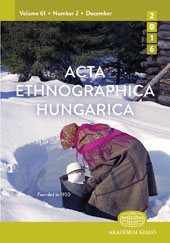Hungarian Ethnographers in Non-European Territories – a Revival after 1990
Hungarian Ethnographers in Non-European Territories – a Revival after 1990
Author(s): Mihály SárkánySubject(s): Ethnohistory, International relations/trade, Cultural Anthropology / Ethnology, Sociology of Culture, Transformation Period (1990 - 2010)
Published by: Akadémiai Kiadó
Keywords: political context; ethnography; sociocultural anthropology; fieldwork; Ob-Ugrians; Altaic peoples;
Summary/Abstract: Research in non-European territories became an essential component of scientific life in Hungary before the First World War. A search for relatives by language and culture was the main motivating force that led Hungarian ethnographers to the East to accumulate knowledge about cultures of Ob-Ugrians and peoples in Central Asia. Others traveled to the Far East, to South Asia or other continents with different goals, but also contributed to knowledge about distant lands and cultures. These efforts resulted in a great tradition of interest in cultures of the world, which survived eras when Hungarian ethnographers had a very limited chance to do fieldwork outside Hungary, and its revival is demonstrated by a large number of fieldwork after 1990, when Hungarians had once again more freedom and means to travel and formerly closed regions became accessible. This revival involved a shift from an ethnology focused on the past and ethnic traditions to a sociocultural anthropology focused on the present and current problems.
Journal: Acta Ethnographica Hungarica
- Issue Year: 61/2016
- Issue No: 1
- Page Range: 13-34
- Page Count: 22
- Language: English
- Content File-PDF

